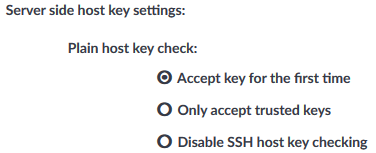The following sections describe configuration settings available only for the SSH protocol. Use the following policies to control who, when, and how can access the SSH connection.
-
Host keys and host certificates: One Identity Safeguard for Privileged Sessions (SPS) allows you to set how the identity of the client hosts and servers is verified. For details, see Setting the SSH host keys of the connection.
-
Authentication Policy: Authentication policies describe the authentication methods allowed in a connection. Different methods can be used for the client and server-side connections. For details, see Authentication Policies.
-
User List: A user list is a list of usernames permitted to use — or forbidden from using — the connection. Essentially it is a blacklist or a whitelist. All users matching the other requirements of the connection are accepted by default. For details, see Creating and editing user lists.
-
Channel Policy: The channel policy determines which SSH channels (for example terminal session, SCP, and so on) can be used in the connection, and whether they are audited or not. The different channels may be available only under certain restrictions, as set in the channel policy. For details, see Creating and editing channel policies.
-
SSH settings: SSH settings determine the parameters of the connection on the protocol level, including timeout value and greeting message of the connection. The following parameters determine which algorithms are used in the connections, and can be set independently for the client and the server side: key exchange, host key, cipher, MAC, and compression algorithms. The default values include all possible algorithms. For details, see Creating and editing protocol-level SSH settings.
-
Content Policy: Content policies allow you to inspect the content of the connections for various text patterns, and perform an action if the pattern is found. For example, SPS can send an e-mail alert if a specific command is used in an SSH terminal session. For details, see Creating a new content policy.
-
Authentication and Authorization plugin:
One Identity Safeguard for Privileged Sessions (SPS) provides a plugin framework to integrate SPS to external systems to authenticate or authorize the user before authenticating on the target server. Such plugins can also be used to request additional information from the users, for example, to perform multi-factor authentication.
For details, see Integrating external authentication and authorization systems.

 to display the details of the connection.
to display the details of the connection.

